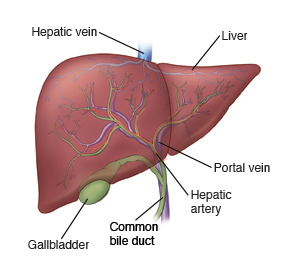You may have hepatitis. Your test results have not come back yet. Hepatitis is an inflammation of the liver.
Causes
The most common causes of hepatitis are viruses. Alcohol and drug abuse, chemical toxins, food contaminated with feces, and immune disorders can also cause hepatitis. So can diabetes, obesity, and metabolic syndrome.
When a virus causes hepatitis, it is called viral hepatitis. The hepatitis viruses A, B, and C commonly cause viral hepatitis. Hepatitis D is an uncommon virus that occurs when you already have hepatitis B. Other viral infections can also cause hepatitis, such as the viruses that cause mononucleosis and chicken pox.
All the hepatic (liver) viruses have one thing in common. That is, once they are spread to you, they infect the liver and then cause inflammation (hepatitis). The viruses are spread in different ways. But all of them can affect your health over a long time. Possible complications include cirrhosis, liver cancer, and liver failure.
Viral hepatitis can be spread through contact with contaminated body fluids. It can also be spread by blood products, transfusions, IV drug use, tattoos and piercings with nonsterile instruments, and certain medical procedures. Hepatitis B can be spread through sexual contact. Hepatitis C is rarely spread through sexual contact. Hepatitis A can be acquired by contaminated food or water and contact with stool from an infected person.
Symptoms
Many people with hepatitis B and C have no symptoms or only mild ones when they are first infected. Often this is also the case for many years afterward. But hepatitis can cause damage to your liver. It can become chronic in some people. Symptoms often last 1 to 3 months in the early stages. Symptoms can include:
-
Tiredness, fatigue, or weakness
-
Low-grade fever
-
Loss of appetite
-
Upset stomach, nausea, or vomiting
-
Abdominal pain
-
Dark yellow-colored urine
-
Light-colored or pale stool (gray or clay color)
-
Yellow color of the skin or eyes (jaundice)
Home care
-
You may get tired easily. Get plenty of rest. Light activity is fine. Don’t overexert yourself.
-
A low-fat diet is best. Have small, frequent meals if you have nausea.
-
If you have a fatty liver from diabetes, obesity, or metabolic syndrome, exercise and weight loss are very important. So is treating the underlying condition. This can improve your fatty liver. Don't follow diets high in simple carbohydrates.
-
Stay hydrated. Drink at least 6 to 8 glasses of fluid per day.
-
Don't drink alcohol until further liver testing is done. Discuss drinking alcohol with your healthcare provider. If you are an alcoholic, hepatitis is a sign that you need to stop drinking for good. Talk to your healthcare provider for help with this.
-
Acetaminophen and anti-inflammatory medicines such as ibuprofen and naproxen can be toxic to the liver in high doses, with prolonged use, or in the presence of existing liver damage.
-
If you have hepatitis, don't take these medicines until you talk with your healthcare provider.
-
If you have only mild or no liver damage from chronic hepatitis, you may take acetaminophen in low doses (2 grams per 24 hours). Check with your provider about anti-inflammatory medicines. Never take acetaminophen with alcohol, since this increases the risk of liver damage.
-
Preventing the spread of hepatitis
Until tests are complete, it is not known if your condition is contagious. Assume that you can pass along hepatitis until you learn otherwise. Until you get test results showing that you are not contagious, don't expose others to your body fluids, as follows:
-
Wash your hands often, especially after you use the bathroom.
-
Parents caring for a baby with hepatitis should use disposable diapers. Wash your hands after changing the baby.
-
Pregnant women are often tested for hepatitis B. There are ways to lower your risk of transmission to the baby.
-
Food service workers should not work until cleared by their healthcare providers.
-
Don't have sex without a condom.
-
Never share needles, syringes, or tattoo equipment.
-
Don't donate blood.
-
Don't share razors or toothbrushes.
-
If you need medical or dental care, tell the staff that you have hepatitis.
Follow-up care
Follow up with your healthcare provider, or as advised.
If tests show that you have infectious hepatitis, you will be given more information. People who live with you should contact their healthcare providers or the local public health department as soon as possible. This is so they can be tested and get a vaccine. People who are exposed to you in any of the ways described above should also seek testing and treatment. A vaccine can be given up to 2 weeks after a person is exposed. (Vaccines are available for hepatitis A and B only. There is no vaccine for hepatitis C. But it can be treated.)
If tests such as an MRI, a CT scan, or an ultrasound were done, they will be reviewed by your provider. Contact your provider for results.
Call 911
Call
-
Trouble breathing or swallowing, wheezing
-
Confusion
-
Extreme drowsiness or trouble waking up
-
Fainting or loss of consciousness
-
Rapid heart rate
-
Vomiting blood or significant rectal bleeding
When to get medical advice
Call your healthcare provider right away if any of these occur:
-
Frequent vomiting
-
Weight loss from poor appetite
-
Increase in abdominal pain or swelling
-
Increasing drowsiness or confusion
-
Weakness or dizziness
-
New or increasing yellow color of skin or eyes
-
Bleeding from the gums or nose or easy bruising


